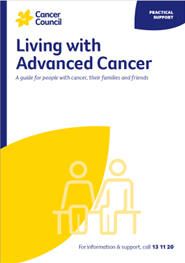- Home
- About Cancer
- Advanced cancer
- Living with advanced cancer
- The emotional impact
- Common reactions
Common reactions
It’s natural to have a lot of different emotions. If you didn’t know you had cancer, a diagnosis of advanced cancer can sometimes seem like a double blow. If it’s cancer that’s come back, you may be more upset than the first time you were diagnosed. Or you may even feel relieved if you suspected there was something wrong, because now you know why.
Everyone reacts differently – especially when told that the cancer is probably too advanced to cure. Give yourself time to absorb what is happening. There is no right or wrong way to react. You might feel one way at first and a completely different way later. It might help to know that your reactions are natural, and that there is support available to manage a range of emotions.
Common feelings you may experience
You may have a range of emotions, including:
| Denial | It can be hard to accept that there are limited treatment options or that the cancer can’t be cured. While denial can give you time to adjust to reality, if it’s ongoing you may delay getting treatment or help. Discuss your diagnosis with your doctor, no matter how you feel. |
| Fear or anxiety | It is frightening to hear that the cancer is advanced when you are diagnosed, or that it has come back or spread. You may be anxious after the shock of diagnosis, or fearful of dying. If these emotions become overwhelming, they may lead to panic attacks. |
| Anger | You may feel angry that you weren’t diagnosed earlier, or because you’ve had to deal with cancer already, or because you feel your life will be cut short. Some people feel angry that, despite leading a healthy lifestyle, they have been diagnosed with cancer. This anger may be directed at family or friends, at doctors, or you may be angry at yourself. Asking “why me?” is completely understandable. |
| Guilt | It’s common to blame yourself for the cancer. You may look back at possible symptoms you think you missed, or fear that your lifestyle may have somehow contributed to the cancer. Remember that the reason cancer spreads or doesn’t respond to treatment is usually unknown. You may also worry about how your family will cope or feel guilty that they may have to take care of you. |
| Uncertainty | You may have less control over your life and your emotions, and this may leave you feeling helpless or powerless. It can be hard to adjust to an uncertain future or get used to the feeling of not knowing, especially if you are used to being organised or independent. |
| Loneliness | Even if you have people around, you may feel lonely at times. Feeling like nobody understands what you’re going through can be isolating. While family and friends are usually supportive, some may have trouble coping with the diagnosis, or misunderstand it. Some people may even distance themselves from you |
| Sadness or depression | Feeling sad after a cancer diagnosis is a natural response. And your family and friends are often feeling down too. If you have continued feelings of sadness, have trouble getting up in the morning or have lost motivation to do things that previously gave you pleasure, talk to your doctor as you may have depression. Support is available for depression. |
→ READ MORE: Ways to manage your emotions
Podcast: Living Well with Advanced Cancer
Listen to more of our podcast for people affected by advanced cancer
More resources
Dr Lucy Gately, Medical Oncologist, Alfred Health and Walter and Eliza Institute for Medical Research, VIC; Dr Katherine Allsopp, Supportive and Palliative Care Specialist, Westmead Hospital, NSW; A/Prof Megan Best, The University of Notre Dame Australia and The University of Sydney, NSW; Dr Keiron Bradley, Palliative Care Consultant, Medical Director Palliative Care Program, Bethesda Health Care, WA; Craig Brewer, Consumer; Emeritus Professor Phyllis Butow, Psychologist, The University of Sydney and Chris O’Brien Lifehouse, NSW; Louise Durham, Palliative Care Nurse Practitioner Outpatients, Princess Alexandra Hospital, Metro South Palliative Care, QLD; Dr Roya Merie, Radiation Oncologist, ICON Cancer Centre, Concord, NSW; Penny Neller, Project Coordinator, National Palliative Care Projects, Australian Centre for Health Law Research, Queensland University of Technology, QLD; Caitriona Nienaber, 13 11 20 Consultant, Cancer Council WA; Xanthe Sansome, Program Director, Advance Care Planning Australia, VIC; Sparke Helmore Lawyers; Peter Spolc, Consumer.
View the Cancer Council NSW editorial policy.
View all publications or call 13 11 20 for free printed copies.
Need to talk?
Support services
Coping with cancer?
Speak to a health professional or to someone who has been there, or find a support group or forum
Looking for transport, accommodation or home help?
Practical advice and support during and after treatment
Cancer information
Dealing with the diagnosis
Common reactions to a cancer diagnosis and how to find hope
Explore our resource hub
Explore and download our booklets, fact sheets, podcasts, webinars and videos for people affected by cancer

